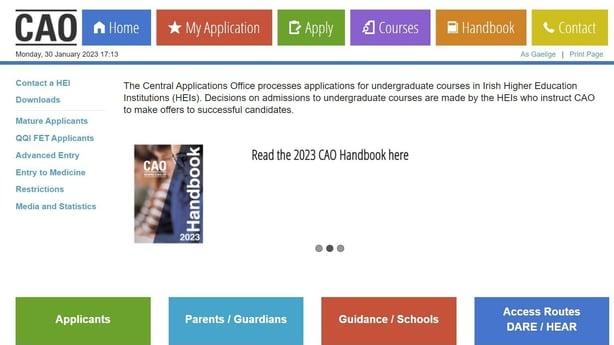Well done to the Class of 2023! The Leaving Cert is finally finished for everyone and the results are in.
Some of you may have already had it all wrapped up and have been taking some time to think about what comes next.
There are many ways to end up in the career you want and the Department of Further and Higher Education, Research, Innovation and Science have shared some great options for further education and training with us. So, take a breath and whenever you are ready read on...

CAO Options
When you log onto the CAO website, you can will see further education choices, apprenticeship choices as well as higher education choices via the cao.ie/option page.
The Leaving Cert can be a pathway to your next step in life, but there is a place for you in tertiary education if you want it – whether it be higher education, further education or apprenticeships.
There are so many ways for you to get to where you want to. So, for example; if you've put down science in a University through the CAO, and if you don't get the points, for whatever reason, there are pre-science courses you can do in your local Further Education college, that can help you progress to a career in the area of science.
There are so many avenues open to you, education is about opening doors, not closing them. Log onto cao.ie/options to find out more.
There are so many avenues open to you, education is about opening doors, not closing them. Log onto cao.ie/options to find out more.

So what is…Further Education?
Further Education and Training or FET offers a wide variety of life-long education options to anyone over the age of 16 at Levels One to Six on the National Framework of Qualifications (NFQ).
FET includes, traineeships, Post Leaving Cert (PLC) courses, community education and adult education as well as adult literacy and numeracy services.
There are lots of different courses available. Some of them qualify you for a wide range of specific careers and designed to prepare you for entry to the world of work, while other courses can be useful for progression into higher education.
For example, you can do a course in business, law, nursing or art portfolio as preparation courses. The national website for further education and training options is www.thisisfet.ie where you can see find information on, and apply for, a range of both full and time part time, fully accredited courses.
FET courses and programmes are provided through 16 Education and Training Boards (ETBs) across Ireland which means FET programmes are available in every country county and local communities. Contact your local ETB to find Further Education and Training programmes on offer near you.
Contact your local ETB to find Further Education and Training programmes on offer near you.

Can I start in FET and move on to a university?
For the first time ever, you can commence your higher education degree course with your local Education and Training Board and conclude your studies in the Higher Education Institution.
This new route means that for the first time in Ireland, you will see guaranteed access – not a lottery – subject to passing exams, to a degree programme that starts in further education and concludes in higher education.
You can commence your degree study in the Further Education and Training Campus or College of your local Education and Training Board and then progress with guaranteed access to continue your degree studies in higher education.
It is expected that a new website www.nto.ie, will be launched later this year. All of the new tertiary degree courses will be displayed along with information about the course, details on course content, entry requirements, course qualifications and awarding body, location and transport links. Contact details for the course coordinator will be on the course details page if you would like to get more information.
You can also speak with your local ETB Adult Guidance Counsellor and you can access further information HERE.
You can also access FET courses nationally, on the Fetchcourses.ie website, where over 6000 FET courses are open throughout the year.
Additionally, you can find more information on FET courses, stories from learners on FET courses and their careers / learning journey and general news about the sector on www.thisisfet.ie.

What is an Apprenticeship?
An Apprenticeship is a work-based learning. It incorporates a minimum of 50% on-the-job training with off-the-job training. The off-the-job learning ranges from remote or online learning to one day per week or longer duration, typically from 10-20 weeks, in a third level institutions. It varies depending on what apprenticeship you are doing and there is lots of choice.
Apprenticeships last between 2 and 4 years, and lead to qualifications up to PhD level. There are currently 67 different types of apprenticeship programmes. One of the great things about apprenticeship is you can earn money while you learn.
You can become an apprentice in areas such as engineering, agriculture, sport turf management, carpentry, plumbing, electrical, hairdressing, finance, IT, insurance, sales, healthcare, property, recruitment, science and many others once you find an approved apprenticeship employer.
Lots of new programmes have been added recently including:
- Sportsturf Management
- Bar Manager
- Wind Turbine Maintenance
- Transport Operations & Commercial Driving
- Cybersecurity Practitioner
Apprenticeship is for everyone; school-leavers, jobseekers, career changers and those upskilling. You can find out more at apprenticeship.ie and see the list of available programmes here.
How do I apply for an Apprenticeship?
An apprenticeship is offered on the basis of a contract of employment between the apprentice and their employer.
Apprenticeships are "demand-led". This means that the number of places is determined by how many apprentices employers need.
For example in the case of craft apprenticeship*, this employment may start at any time of year, with subsequent off-the-job training scheduled accordingly throughout the year.
For the consortia-led apprenticeships*, this often happens in January and in September/October of each year but this can vary from programme to programme, and the application process is usually open all year round.
Check apprenticeship.ie to see what apprenticeship jobs are open for application.
You can also find the contact details of the consortia leads for the newer consortia led apprenticeships who will have details of course structure and may have details of potential interested employers, by clicking on the FAQ-> Find out More section under each listing in the Apprenticeship Directory on the website.

What about student grants?
Student Grants are available to eligible applicants for PLC, Undergraduate and Postgraduate courses.
The Government made changes to the Student Grant Scheme in the last Budget to address the costs of going to college for students and their families.
For the coming academic year, the income threshold for the 50% student contribution grant is increasing from €55,240 to €62,000
There is also a new student contribution grant of €500 introduced for eligible households earning between €62,000 and €100,000
These changes mean that up to 50,000 undergraduates could receive support under the Student Grant Scheme for the first time.
Students in the 2023/24 academic year will also see the full benefit of increases to the maintenance grants announced in Budget 2023. From 1 January 2023, the Special and Band 1 maintenance grant rates increased by 14% and all the other maintenance grant rates increased by 10%.
The increase in student earnings outside of term time from €4,500 to €6,552 will also come into effect for the 2023/24 academic year.
And there will be a reduction in the eligibility period from 5 years to 3 for second chance mature students who did not complete a course and are returning to college to pursue an approved course at PLC, undergraduate or postgraduate level.
For more information, and to find out if you what you might be eligible for, go to www.susi.ie.
Other financial supports may also be available for students attending Higher Education and students can check out www.studentfinance.ie for more details.
In addition students who may be concerned about financial supports should contact the access office of the institution they wish to attend who may be in a position to advise them of further support available within the institution.